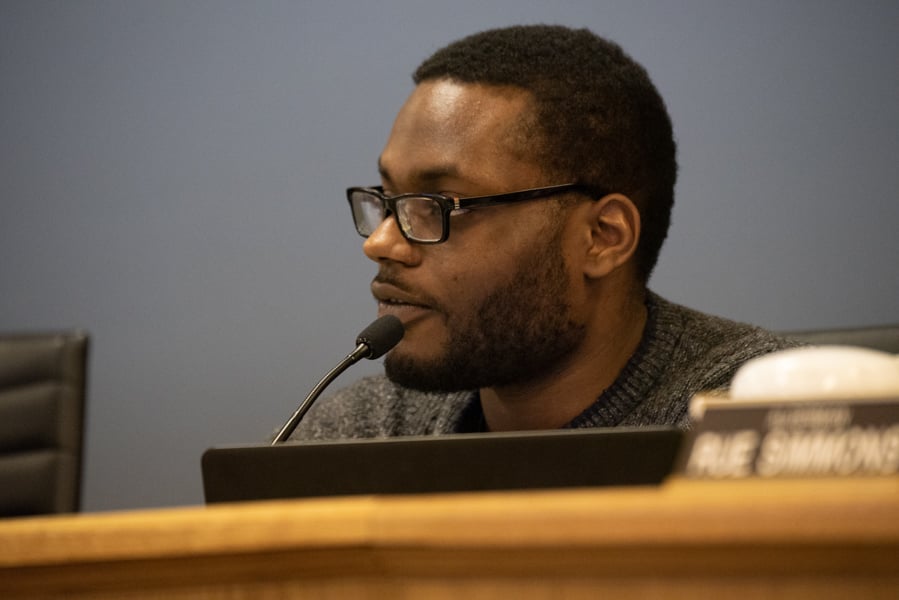Evanston officials approve $1.25 million Lawrence Crosby settlement, call for end to racial criminalization
Noah Frick-Alofs/Daily Senior Staffer
City Clerk Devon Reid speaks at City Council. Reid emphasized the importance of reforming the racial criminalization system at Monday’s meeting
January 29, 2019
After the Evanston City Council approved a lawsuit settlement involving the wrongful arrest of former Northwestern graduate student Lawrence Crosby, residents and council members on Monday called for systemic changes to prevent further racial criminalization.
Crosby was arrested on Oct. 10, 2015, after a woman called 911 suspecting him of stealing a car that turned out to be his own. Evanston Police Department officers charged Crosby, who earned his PhD from McCormick last June, with disobedience to police. In 2017, former 9th Ward Ald. Brian Miller called for the release of the video of Crosby’s arrest. After the original charges against Crosby were dismissed in court, he filed a lawsuit against the city and the four officers who stopped him, which was settled earlier this month for $1.25 million.
At Monday’s meeting, residents and council members blamed the city for the “reputational harm” the city’s response to the lawsuit caused.
“The bulk of the $1.2 million settlement is compensation for reputational harm caused by us, the city and our refusal to take responsibility and work towards justice,” said City Clerk Devon Reid.
Reid spoke from the lectern as a citizen — though he wanted to speak from the dais as clerk, Mayor Steve Hagerty instructed him to speak outside of his official role.
Evanston resident Misty Witenberg also said the city is in this “mess” because city officials “refused to take blame” from the start.
“Instead of apologizing to this young man, we pursued charges against him that even officers on the scene had said they knew were going to fall apart,” Witenberg said. “That was at taxpayer expense. His initial suit asked for less than $50,000 and it increased to what it is now because we repeatedly smeared him, and we used city platforms to do that.”
Beyond financial cost, Reid said making sure that such incidents don’t occur again is essential for public trust. Reid was disappointed that the city carried on with charges instead of apologizing to Crosby.
Both Reid and Witenberg were also frustrated over the city attorney’s decision to pursue charges knowing they would be dismissed in court.
“The public has an interest in the city’s acknowledgement of when we do wrong,” Reid said.
Witenberg denounced the interests of the city’s legal department. She said the attorneys represent the city and its interests as if it were a corporation, but City Council is supposed to be representing the public interest.
“Protecting the city from having to admit when it’s wrong to members of the public is not in the public interest,” Witenberg said. “When public interest and corporate interest conflict, we’re finding people working against our interest. That’s a systemic problem.”
Reid said the city has issued a number of reforms, including body cameras for all officers and a cessation of policy forcing suspects into the prone position during felony traffic stops.
However, he said the institution of criminalization based on race still needs to change.
“The swift suspicion and criminalization of the black body and of young black men is unfortunately ingrained deeply into the bedrock of our culture,” Reid said. “We must, as individuals and as this institution, check racial bias, afford our neighbors the benefit of the doubt and be willing to investigate further.”
Ald. Donald Wilson (4th) said the challenging part of the issue is considering the underlying factors in Crosby’s case. He called on the city to start asking harder questions.
“This has to force us to dig deeper and to acknowledge prejudices that underlie these events,” Wilson said. “Excuses aren’t acceptable. Rationalizations aren’t acceptable.”
Wilson said broader circumstances and policies led to the Crosby case and emphasized the need for policy change.
In the future, Wilson said city council members have a job beyond just listening. To effect real and long-term change, part of their job is to “do everything they can to tear down the barriers that have been put up.”
“These barriers have existed for a long time,” Wilson said. “They’ve been carefully constructed, but going forward we’re accountable for the future.”
Clarification: This article was updated to clarify the dismissal of the initial charges filed against Crosby.
Email: [email protected]
Twitter: @cassidyw_


